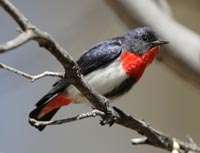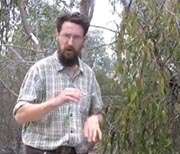Mistletoe birds are 'cheats'

Contrary to popular belief, specialist animals such as the Mistletoe bird from Australia are not vital to the spread of parasitic mistletoes through woodlands and forests but 'cheat' on the efforts of more common birds that move mistletoe plants into new areas.
Associate Professor David Watson, a senior ecologist with Charles Sturt University's (CSU) Institute for Land, Water and Society, has analysed the results of five studies he has carried out in Australia and Central America that demonstrate that specialists that depend on single groups of plants are not as important as once believed for the dispersal of the plant. These were recently published in the prestigious journal Oecologia, and also recorded in a podcast – see below.
"The conventional explanation is that parasitic mistletoe plants are dispersed by specialist birds such as the Mistletoe bird eating its nutritious fruit and carrying the seed to infest new trees," Professor Watson said.
"You only find these birds where there are lots of mistletoe plants. The original story was the plants can't live without the birds, and vice versa – known as 'mutualism'. Our research suggests this is just a story.
"We found the specialists only occur where there are existing mistletoes, and they don't travel to areas where mistletoe is absent. From the plant's point of view these birds are lousy dispersers. They don't take them to new areas, to uninfected forests, or uninfected trees. They are only found where it already grows. They are specialists not only in diet but in where they live."

So Professor Watson considered the question 'if the specialists are not spreading them around like we'd presumed, then who is?' He found that there were many other birds – or 'generalists' - that eat mistletoe fruit as well as insects, nectar and other fruit.
"Mistletoe is very tasty fruit. It is full of amino acids, fats, and sugars. So even if birds eat bugs, mistletoe fruit is still good tucker and they eat the berries as part of a much broader diet," he said.
"That broader diet takes them to other places, areas with and without mistletoe, and while they're chasing insects of finding nectar, they're dropping off mistletoe seeds that they ate elsewhere. And once the mistletoe is established, then the specialists move in and spread it from those centres to make it bigger and better for them.
"The specialists are cheats. They are exploiting this very nutritious food source and they are probably having a detrimental effect on host trees by visiting the same trees repeatedly and increasing mistletoe loads in their canopies."
When combined with other ecological research being carried out worldwide, Professor Watson believes this shows specialist species are not so special and necessary as traditionally believed.
"It's the generalists that are the unsung heroes in maintaining ecological interactions such as pollination or predation over time," Professor Watson said.
"Parasites such as mistletoes can be pretty important in regulating the size of populations. Knowing the factors that limit where these parasites occur have important implications for the management of forests and plantations. We need to know the pathways that parasites take in infecting cash crops.
"Managers need to know who to keep an eye on, and it's not necessarily the specialists."
More information: Watson, D. Mistletoe specialist frugivores: latterday 'Johnny Appleseeds' or self-serving market gardeners?, Oecologia, vol. 172 issue 4. dx.doi.org/10.1007/s00442-013-2693-9
Listen to Assoc Prof David Watson .
Journal information: Oecologia
Provided by Charles Sturt University


















